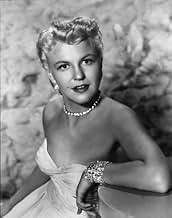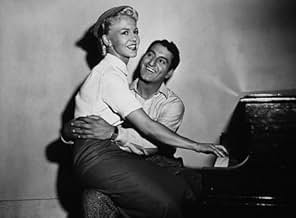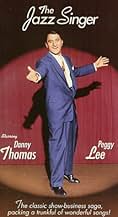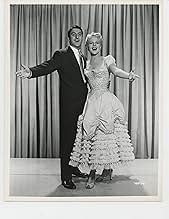AVALIAÇÃO DA IMDb
5,7/10
442
SUA AVALIAÇÃO
Adicionar um enredo no seu idiomaJerry dreams of becoming a famous jazz singer, but to accomplish that, he must defy his father, a Jewish Cantor who opposes such a dream as a future for a son of his.Jerry dreams of becoming a famous jazz singer, but to accomplish that, he must defy his father, a Jewish Cantor who opposes such a dream as a future for a son of his.Jerry dreams of becoming a famous jazz singer, but to accomplish that, he must defy his father, a Jewish Cantor who opposes such a dream as a future for a son of his.
- Direção
- Roteiristas
- Artistas
- Indicado a 1 Oscar
- 1 indicação no total
Murray Alper
- Taxi Driver
- (não creditado)
Jimmy Ames
- Music Store Proprietor
- (não creditado)
Avaliações em destaque
The Jazz Singer is one of a number of films made in the late 1940's and 1950 about the Jewish experience in the United States. Other than Crossfire(1947) and Gentleman's Agreement(1947) which dealt with anti-semitism they usually had a musical-theatre background. These films included The Jolson Story(1946), Jolson Sings Again(1949), The Eddy Duchin Story(1951), The Eddie Cantor Story(1953),The Benny Goodman Story(1956) and Margorie Morningstar(1958). The leading actors in these "Jewish" films were always played by non-Jews. For example Larry Parks a non-Jew played Al Jolson and Gene Kelly played Noel Airman in Marjorie Morningstar. This casting was probably done to make the Jewish theme palpable to a mainly non-Jewish audience. The Jazz Singer(1952) is no different. Danny Thomas was a devout Catholic and Peggy Lee was certainly not Jewish although she plays a non-practicing Jewess in the film. The clue to her background is when she attends the Golding's family meal before entering she says "I haven't been to a sader (passover service) since I left home".
The film is about a cantor's son who has just left the service after seeing action in Korea. His dilemma is whether to become a cantor, a family tradition or to be a singer in musical theatre. His choice of theatre leads to an inevitable conflict with his father.
However, there is much more to this film than this. This film was made after the Rosenberg trial during the McCarthy whitchhunts and the Hollywood blacklist. Therefore in this film the Jews are shown as good loyal citizens and
are quintessentialy American. The synagogue choir would rather play baseball than practice. The cantors friends also talk about baseball in fact one of them is a Major League umpire. The synagogue itself dates back to 1790 and George Washington is said to have visited. Therefore Jews are presented as part and parcel of American society. Nobody in this film has a Eastern European accent. Peggy Lee appeared in very few feature films. In this film you get to see her sing "Lover" and "Just One of Those Things" wonderful. Danny Thomas is quite credible and he acts and sings the part very well. The comedic routines could have been left out. Yes, the film is schmaltzy and sentimental but it is well worth seeing. I enjoyed it very much.
The film is about a cantor's son who has just left the service after seeing action in Korea. His dilemma is whether to become a cantor, a family tradition or to be a singer in musical theatre. His choice of theatre leads to an inevitable conflict with his father.
However, there is much more to this film than this. This film was made after the Rosenberg trial during the McCarthy whitchhunts and the Hollywood blacklist. Therefore in this film the Jews are shown as good loyal citizens and
are quintessentialy American. The synagogue choir would rather play baseball than practice. The cantors friends also talk about baseball in fact one of them is a Major League umpire. The synagogue itself dates back to 1790 and George Washington is said to have visited. Therefore Jews are presented as part and parcel of American society. Nobody in this film has a Eastern European accent. Peggy Lee appeared in very few feature films. In this film you get to see her sing "Lover" and "Just One of Those Things" wonderful. Danny Thomas is quite credible and he acts and sings the part very well. The comedic routines could have been left out. Yes, the film is schmaltzy and sentimental but it is well worth seeing. I enjoyed it very much.
Angels sing above the Temple Sinai in Philadelphia, while dashing Danny Thomas (as Jerry Golding) returns from service in the Korean War. Celebrating the Jewish New Year (Rosh Hashanah), Mr. Thomas' observant parents Eduard Franz and Mildred Dunnock (as David and Ruth) are proud of their son's honorable discharge. Father Franz retires as cantor at the Temple so that Thomas can take over the position. The family has served as cantor for six generations. However, Thomas has decided to break with tradition. He wants to pursue a secular career in show business. Mother Dunnock seems understanding, but father Franz is righteously indignant. Life is tough for Thomas, but having singing girlfriend Peggy Lee (as Judy Lane) around helps...
In a part played by George Jessel on Broadway (1925-1926) and Al Jolson in the movies (1927), Thomas has big shoes to fill. Although he recorded his songs, some of Thomas' dubbing doesn't look authentic. Also, he has stand-up comic skills far superior to the flat routines you see here, which are evident in his long career. Other than that, Thomas is convincing in the role...
While a little lax in the dramatic scenes, Ms. Lee is the film's main asset. Her voice is exquisite and, more importantly, she and director Michael Curtiz make each musical number feel like it belongs exactly where it appears in the script. Unfortunately, Lee's role has been revised to match the religion of Thomas' character. This weakens the story's central conflict (between Thomas and Franz). It looks spectacular in Technicolor, but we wonder why Thomas' parents live in a luxurious palace, where modestly-attired mother Dunnock stands out by refusing a fur coat and dressing like the help. A consistent best supporting actress, Dunnock and Mr. Curtiz make her mother role the most technically well-drawn, with her final scene wordlessly offering conflict resolution.
****** The Jazz Singer (12/30/52) Michael Curtiz ~ Danny Thomas, Peggy Lee, Mildred Dunnock, Eduard Franz
In a part played by George Jessel on Broadway (1925-1926) and Al Jolson in the movies (1927), Thomas has big shoes to fill. Although he recorded his songs, some of Thomas' dubbing doesn't look authentic. Also, he has stand-up comic skills far superior to the flat routines you see here, which are evident in his long career. Other than that, Thomas is convincing in the role...
While a little lax in the dramatic scenes, Ms. Lee is the film's main asset. Her voice is exquisite and, more importantly, she and director Michael Curtiz make each musical number feel like it belongs exactly where it appears in the script. Unfortunately, Lee's role has been revised to match the religion of Thomas' character. This weakens the story's central conflict (between Thomas and Franz). It looks spectacular in Technicolor, but we wonder why Thomas' parents live in a luxurious palace, where modestly-attired mother Dunnock stands out by refusing a fur coat and dressing like the help. A consistent best supporting actress, Dunnock and Mr. Curtiz make her mother role the most technically well-drawn, with her final scene wordlessly offering conflict resolution.
****** The Jazz Singer (12/30/52) Michael Curtiz ~ Danny Thomas, Peggy Lee, Mildred Dunnock, Eduard Franz
Good grief.. to think I've seen it all.. Danny Thomas looks SO out of place in this mishmash. He seems really uncomfortable. He can't sing worth a lick, and when he's paired up with Peggy Lee (PEGGY LEE???) she easily.. EASILY outsings him! Maybe the director saw this and made him do the reall really bad comedy routines that he sometimes does in the film. Peggy Lee is okay, but the whole thing is a shambles. Good for a laugh, maybe.
This is the second version of the much-filmed tale of the Jewish boy who wants to sing modern music, rather than becoming a cantor in the synagogue. This time, the character is called Jerry Golding and is played by Danny Thomas, a second-string singer and comedian of the fifties, perhaps best known for his TV series.
The story itself is sparse, but Thomas gets a chance to put across some swing numbers (one or two in the company of his lady friend Judy Lane, played by the sparky Peggy Lee, in a role originally planned for Doris Day). As Golding's parents, Eduard Franz and Mildred Dunnock give good value as they struggle to understand the culture clash which has seen their son look for fame as a popular crooner.
A minor film, and one not helped by the humorous approach (perhaps to accommodate Thomas's particular style). But, this version of 'The Jazz Singer' is as good a way as any to spend a Sunday afternoon.
The story itself is sparse, but Thomas gets a chance to put across some swing numbers (one or two in the company of his lady friend Judy Lane, played by the sparky Peggy Lee, in a role originally planned for Doris Day). As Golding's parents, Eduard Franz and Mildred Dunnock give good value as they struggle to understand the culture clash which has seen their son look for fame as a popular crooner.
A minor film, and one not helped by the humorous approach (perhaps to accommodate Thomas's particular style). But, this version of 'The Jazz Singer' is as good a way as any to spend a Sunday afternoon.
10harveytk
I saw this film back when it opened in the very early 50's at , I think,The Brooklyn Museum with my aunt and cousin. I must have been 6-7 years old at the time, and to this day I have never forgotten the film. I particularly remember Danny Thomas singing wonderfully in the film and was very taken with not only his performance of Jerry Golding but also of Eduard Franz who played his father. Wonderful remake of Jolson's original version which opened almost 20 years before I was born. I have always been a huge Jolson fan since I was a small boy, and I wonder if this film did not reinforce that. Sorry it is rarely shown on any Cable network. I have the original soundtrack and listen to it all the time. Great songs, great story, great acting, great film! By the way, I did not like the 1980 version at all.
The story of a Korean war veteran returning home to start a new life as an entertainer instead of taking over the reins of succeeding his father as a Cantor was, I think, very relevant for that time and I think was depicted beautifully. Glad the plot had Mr. Franz recovering from his illness to enjoy his son's success at the end of the film. Nice touch!
The story of a Korean war veteran returning home to start a new life as an entertainer instead of taking over the reins of succeeding his father as a Cantor was, I think, very relevant for that time and I think was depicted beautifully. Glad the plot had Mr. Franz recovering from his illness to enjoy his son's success at the end of the film. Nice touch!
Você sabia?
- CuriosidadesMichael Curtiz originally wanted Doris Day to play the role of Judy Lane.
- Erros de gravaçãoCatwalks, lights and other equipment rigged to the roof of the sound stage are clearly visible during a shot of an audience supposedly sitting in a real theater.
- ConexõesReferenced in The Danny Thomas Show: Linda, the Performer (1960)
Principais escolhas
Faça login para avaliar e ver a lista de recomendações personalizadas
- How long is The Jazz Singer?Fornecido pela Alexa
Detalhes
- Data de lançamento
- País de origem
- Idioma
- Também conhecido como
- The Jazz Singer
- Locações de filme
- Empresa de produção
- Consulte mais créditos da empresa na IMDbPro
Bilheteria
- Faturamento bruto nos EUA e Canadá
- US$ 4.360.000
- Tempo de duração
- 1 h 47 min(107 min)
- Proporção
- 1.37 : 1
Contribua para esta página
Sugerir uma alteração ou adicionar conteúdo ausente





































